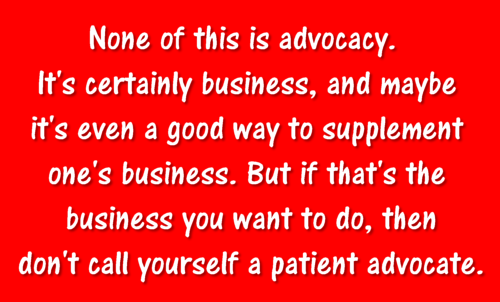From bold-faced lies to misrepresentation – facts that aren’t facts, withholding information, skirting the code of ethics, and shades of truth – honesty and the advocacy business have been on my mind.
This topic was actually triggered by something that has nothing to do with advocacy at all, something that seems relatively innocuous, but then, maybe not-so-innocuous at all: the purchase of a 5-lb bag of sugar to bake holiday cookies last December. Now a 5-lb bag of sugar has always been a 5-lb bag of sugar and has yielded a certain number of batches of cookies. I’ve been buying 5-lb bags of sugar all my baking life, so I grabbed the bag off the shelf at the store as I do every December, knowing that cookie baking was in my near future.
Except that this time, that 5-lb bag of sugar was (you guessed it) only 4 lbs! It didn’t cost any less, but it had 20% less sugar in the bag. Yes, it was labeled correctly, and no, I had not read it carefully enough. But that is SO FAR beside the point. Old habits die hard.
I will never trust that store again when it comes to purchasing sugar or anything else that I have trusted to be of a certain size. Sugar isn’t the only problem. Many other kinds of foods, including breakfast cereal, frozen or canned vegetables, orange juice, pre-packaged produce, and meats. A pound is still a pound, but a package that has always been a certain size is rarely that size anymore.
Fool us all!
That cummupence got me to thinking about other places in life where things are not what they seem to be. For example – the healthcare system. For people of a certain age or older, the healthcare system always seemed accessible and available, provided what we needed when we needed it, through kindly and knowledgeable providers, and at an affordable price (or no cost at all.)
But now, in 2016, that healthcare system no longer exists – not in the US anyway. Period. No patient accessing the American healthcare system can trust any portion of it anymore. We expect 5 lbs of sweet care, and we’re not getting it…
We’ve been fooled once, twice – and now it seems – will continue to be fooled forever…
… which is why people need patient advocates. So, in a way, that “Fool Me Once” led to a new profession in which we are all keenly interested. While we love the work we do, it is sad, in a way, to think about why we are called upon to do it. People can’t trust the system, so they hire us to reclaim the honesty.
My thought process then turned to patient advocates ourselves, and the foundation upon which we are building our profession. Recently I have had conversations with advocates that suggest to me that our foundation is being chipped away at by some practicing advocates. Among us are people who are, sometimes innocently (sometimes not-so-innocently) violating the honesty, ethical standards, and expectations our profession demands, even if we have no formal way to demand them yet.
And that’s a problem. We’re very new, and we have only one chance to make that positive, ethical, above-reproach first impression. When a few outliers aren’t on board with that approach, it becomes a problem for the entire group of us – those of us who are trying to right the healthcare system wrongs described above.
I’m going to provide two examples – one this week, and one soon – and some of you will see yourselves. I fully expect that some of you will be appalled, possibly upset with me, because you’ve not thought of these as violations or misrepresentations. Some of you innocently don’t realize these transgressions; but now, as of reading this post, you are on notice – now you will.
Whether or not you’ve violated your ethics intentionally or innocently, please look at this not as judgment, but as a time for correction.
What I’m about to describe is based on two ethics statements:
a. The Health Advocates Code of Conduct and Professional Standards
b. The Patient Advocate Certification Board’s Code of Ethical Standards
Example #1: Ethics Violations
One of the important ethical foundations for advocates is the requirement to work only within one’s own professional boundaries. The key here is that advocates can never be seen as trying to provide support they don’t have the chops to provide. The nurse advocate who struggles to sort out medical bills, or the medical billing specialist who accompanies a patient to the hospital…
Of course, there could be many times when we don’t have the necessary skills to provide what a client needs. But no one is asking you, as the untrained advocate to just say no. When the skill is not one you possess, then the answer is to bring in other professionals to work with your clients to provide those services (which you can still do the billing for), perhaps as subcontractors or simply as referrals. There is a great deal of information about how to do that both within the APHA Membership site and the book, The Health Advocate’s Start and Grow Your Own Practice Handbook (see the Health Advocate’s Career Series below or at right.)
Further – and this is where I am beginning to hear about violations – Patient Advocate Ethical Standards call for NO payments to be made for referrals. That’s right – no commissions or referral fees allowed. My first brush with this concept came about many years ago when APHA had a member who began promoting her ability to find “the right nursing home for Mom” – for free! But of course, she didn’t do it for free. She was paid commissions by the nursing homes. Now – an ethical advocate would realize how problematic that can become – one nursing home pays this commission, the other pays a higher commission… Who is to say that her choice of #2 nursing home was truly the right one for Mom instead of just the one that paid a higher commission? (Upon discussion, the woman decided APHA membership wasn’t for her.)
And now I have heard about violations of this part of our ethics in some different ways. One advocate sells supplements on her website (in addition to being a conflict of interest, that’s medical – and as of 2020 – she has been caught.). Another advocate is promoting the use of independent medical testing services for which she is paid a commission. Another is paid commissions by a senior mover, another by a home security business. Those are all conflicts of interest, because the trusting relationship that develops between an advocate and a patient-client compels the patient-client to make her choice to purchase or engage because she thinks the advocate has recommended it – and not because she was provided with objective options. Patient advocates don’t recommend.

None of this is advocacy. It’s certainly business, and maybe it’s even a good way to supplement one’s business. But if that’s the business you want to do, don’t call yourself a patient advocate.
Further, know that you will not be able to be certified as a patient advocate, because that kind of business will disqualify you.
Next up – we’ll take up Fool Me Once, Fool Me Twice Part II. It’s a doozie that is being violated by many.
LEARN ABOUT APHA MEMBERSHIP? | ?FIND MORE REASONS PATIENTS NEED ADVOCATES






True .. Great analogy.. I get concerned with so many different professionals being part of advocacy newly
formed profession(After 50 yrs of being in the healthcare system I have seen so many changes ..at times feeling like I am catching the tail and keeping up is most challenging.. Just being in a third world country brought this to my attention even more.. The doctors are being paid 25-35 dollars a month and the nurses were wearing nurses caps )
And the line of clarity becomes very “wavy.”
I applaud your continued discussions to alert and
Attempt to unify what is a truly vital part of the new
Evolving healthcare team. Thank you for for excellent way of
Reminding and continuing to bring the level of professionalism back on track.
Reading your writing style is like reading a book I cannot put down..
Trisha, I am glad you said what needed to be said. As our leader in this nascent industry, best practices are critical for our long-term success. For what it is worth, I met with an assisted living facility last week and they were shocked that I wouldn’t accept remuneration for a referral. That same facility sent me a client within 24 hours. Perhaps, that is the secret lining.
Spot On Trisha! A great reminder and reinforcement of what we stand for as Advocates. Thank you for continuing to require that the Code of Conduct and Ethical Standards be at the core of our profession. As our industry grows, it is
imperative we strive for excellence. As a group we will all reap the benefits.
These conflicts of interest seem so obvious to me. How can patient advocates expect to be part of a trusted professions by accepting payment for anything other than helping clients?